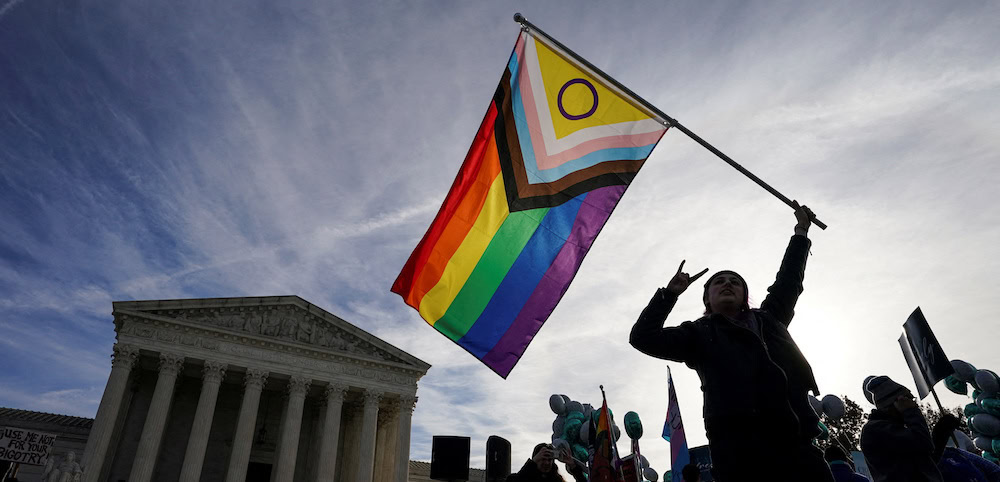
July deadline
As Centrelink’s July 1 deadline for same-sex couples to declare their relationships draws closer there still seems to be a lot of confusion surrounding what the changes mean for welfare recipients and who’ll be counted as being in a relationship.
Government ads with the slogan If you’re a couple at home, you’re now a couple at Centrelink may have added to the confusion of former partners who still live together in a shared home -” particularly if they haven’t read the fine print.
For those in that situation, if you have separate bedrooms, separate bank accounts, and pay rent to your partner if they own the house you live in, you’re not going to be treated as a couple as long as you make clear to Centrelink you’re no longer more than just friends.
Even if you own property together, it doesn’t have to be an issue, so long as you don’t later claim a couple status to gain a benefit there -” such as when one of you moves into aged care accommodation.
These days it’s no longer uncommon for friends to buy houses together to spread the burden of the mortgage, so again, as long as you have separate bedrooms and bank accounts, you should be in the clear.
Another common gripe has been the notion that recognising same-sex couples as dependent somehow means they’re being forced into a heterosexual model of relationship or being treated as if they’re married.
Let’s make this clear -” there’s nothing metaphysical about having different rates of payment for couples and singles.
All our pensioners deserve more, but individuals in coupled relationships receive lower rates of payment because couples get to split many of their living expenses where single people cannot.
A single person living in a one-bedroom house or unit pays double the rent a person sharing that dwelling as part of a couple would. Couples generally use the same amount of electricity and gas as singles, and will often use less water than two people living separately, so partnered people pay a lot less for utilities as well.
And although for government purposes, a couple generally has to live together for six months to be considered de facto, Centrelink treats couples who move in together as couples from day one no matter how long they’re planning on staying together.
For the full details of what the changes will mean for you across all areas, visit ag.gov.au/samesexreform.










Indeed, Andrew, I know of many HIV+ guys who go shopping for dinner with just $5 in their pocket, or have fifty bucks left to last them a week or more until their next dsp day. Contrary to the perception put out by those who practice the ‘we mustn’t stigmatise the disease’ modality, HIV is not a party at a bowling alley with a local drag celeb. dressed as a ‘Glam’ Reaper.
But what you do get, if you’re unlucky, is six months in hospital on intensive chemo to treat an HIV-related cancer, or diahorreah so common that if you pass a firm stool you send out emails to all your friends, and less libido than a terracotta tortoise, or a resistance to meds, and entrenched poverty and the associated depression and isolation, soon to be exacerbated by the SS relationship reforms, chronic fatigue that sees you sleeping most of the afternoon and an awful lot of ‘sero-apartheid’ and ignorance about ‘AIDS’ (it’s not have AIDS, or ‘ASS FLU’, it’s HIV.)
These people clearly are unable to work. They rely on the ‘social contract’ that provides some financial security. They live together because it’s cheaper, it’s company, and because they are there for each other through the times of needing physical or emotional support.
As you can see from the above questions, and according to Centrelink’s general manager, many 1000’s of them are about to lose those supports. They need to be acting now to find ways to define their arrangements as “unmarried” because the burden of that proof will fall on them.
Of course grandfathering will not happen, both Joe Ludwig and Robert McKelland have said as much many times. To lobby on that score is simply pissing in the wind. The lobby should have sought to show the hardship that the social security reforms will create and exempt those in such dire straights on the same basis that affirmative action levels the playing field for other minorities. Nor will a lobby for increases to welfare payment achieve anything other than more wet shoes because with the recession/depression/credit crunch/whatever, the welfare budget is already blowing out by $$$billions.
I’m sorry, but to suggest that “you’re not going to be treated as a couple as long as you make clear to Centrelink you’re no longer more than just friends” or that “you should be in the clear” is about as useful as the fallacy that HIV is a walk on the beach.
Shayne, it’s a tough life for anyone on welfare- on this I can speak from personal experience.
From July 1st it will be as equally tough for same-sex couples as it has been for heterosexual couples for years.
It’s unfortunately clear that the Government is not going to allow a grandfathering of the changes- so from this point on, if we really want to improve the lot of GLBT people on welfare, we should be uniting with interested groups in the wider community to push for a better deal for ALL welfare dependent Australians- straight and gay.
I really wish it is as simple as you make out, Andrew, but for the 11,000 same sex welfare recipients identified by Centrelink as being affected by these changes, its a lot more complicated. Many glbqti people in same-sex de facto relationships will have their Social Security or Family Assistance payments reduced or cancelled as a result of being newly assessed as a member of a couple from 1 July.
For a start, you can read the facts in this document: http://www.welfarerights.org.au/Factsheets/fsmlr.doc prepared by http://www.welfarerights.org.au.
Centrelink will ask a lot of questions to show that a relationship exists: -œDo you provide financial support for each other? jointly own large items? know about each others financial affairs? Has either of you named the other person as a beneficiary in your will or superannuation? lend or give each other money? share the same circle of friends? tell each other where you are daily or what you are doing when you go out? frequently go out together? Do either of you have a boyfriend? visit each others families? Would your friends and families consider you a couple? Do you correct them? Do your family or friends make plans for you as a couple? take holidays together? How long has the relationship lasted? Do you consider the relationship is likely to continue? Who do you talk to when you have a problem? If you suddenly got sick, who would you call? Have you any long term plans involving the other person? If the other person lost their job or had no income, would you feel obliged to offer them financial help for a period of time? does either of you have a sexual relationship with anyone else? do you intend to continue living together in the future? and so on. They comprise a strange criteria for proving ‘a relationship’ and I doubt I’d pass their test if it was applied to me and any of my friends.
The test can also be applied to those living seperately or apart. Investigations may go on for 6-12 months and Centrelink may not contact you to tell you that the investigation has ceased. If Centrelink believes you intentionally provided the wrong information your case may be referred for prosecution. Overpayments will be recovered and even if you are repaying the money, you may still be prosecuted.
Centrelink may also question your friends, hospitals, relatives, employers and neighbours and information is collected from -˜the public’ (for example a dob-in by a neighbour, family member or ex-partner,) the Department of Housing, real estate agents, gas and electricity suppliers, local council, or any other person they think that can provide them with details of a relationship including acon and BGF.
The National Welfare Rights Network stated, While demanding the same treatment of opposite-sex and same-sex couples may seem fair at face value, it will not create equity. It is disingenuous to claim that the Bill removes
discrimination against same-sex couples, when the proposed amendments relating to Social Security and Family Assistance will entrench poverty for individuals whose access to employment benefits, superannuation and
insurance entitlements have already been significantly affected by the discriminatory laws that the rest of the Bill seeks to reform.
Pity our own community doesn’t see it that way.